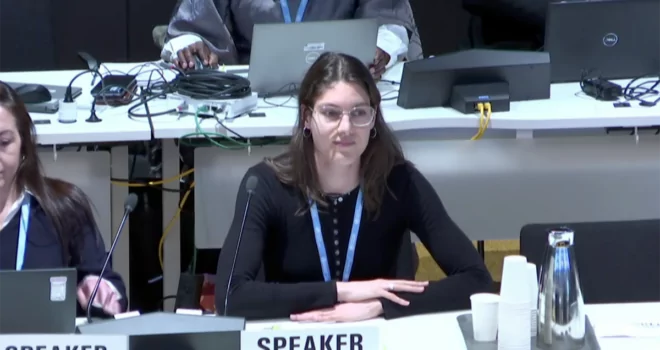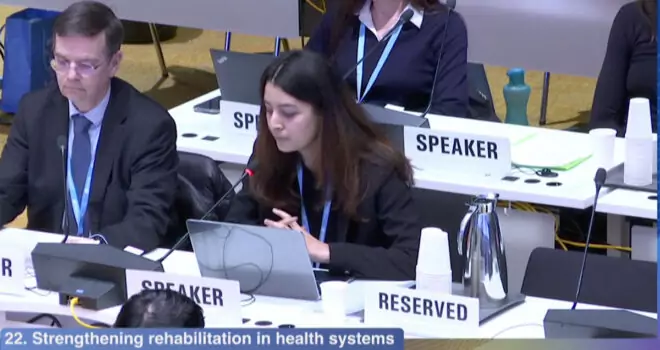In 2025, the World Heart Federation continued its advocacy at the forefront of global health by addressing the intersecting threats of tobacco, environmental degradation, and climate change, which together pose a growing burden on cardiovascular health worldwide.
These issues are closely connected: the tobacco industry contributes to deforestation, soil degradation, and greenhouse gas emissions, while cigarette filters continue to be a major source of toxic waste, including plastic pollution. Simultaneously, climate change amplifies cardiovascular risk through air pollution, extreme heat, and disruptions to food security and healthcare systems – risks feel most acutely in low- and middle-income countries, where 90% of air-pollution–related deaths occur.
From 17 to 22 November 2025, over 1,600 delegates from 160 Parties and civil society organisations gathered in Geneva for the Eleventh Session of the Conference of the Parties (COP11) to the WHO Framework Convention on Tobacco Control (WHO FCTC) to negotiate a wide range of tobacco control measures.
WHF delegates delivered three statements to address:
We urged Parties to accelerate implementation of Article 14, strengthening healthcare professionals’ capacity to deliver tobacco and nicotine cessation support and expand access to evidence-based treatments for nicotine and tobacco dependence. We highlighted that newer tobacco and nicotine products carry heightened cardiovascular risks, and that WHO Model List of Essential Medicines remain the safest and most effective pharmacological tools.
WHF expressed particular concerns regarding limited progress on Article 5.3, which exposes global tobacco control policies to critical vulnerabilities. We called on Parties to firmly reject the tobacco industry’s so-called “harm reduction” narrative and reinforce action on Article 5.3 to protect public health from tobacco industry interference.
Building on this advocacy, WHF co-hosted the side event Turning Commitments into Care: Accelerating Article 14 Implementation, together with the Oriental Republic of Uruguay, the Republic of Panama, Malaysia, the WHO FCTC Knowledge Hub on Article 14, the World Health Organization, Action on Smoking and Health US, Global Alliance for Tobacco Control, InterAmerican Heart Foundation, International Federation of Medical Students’ Associations, Union for international Control, and Vital Strategies.
WHF applauds the Conference of the Parties for adopting key decisions to strengthen global tobacco control in the face of persistent tobacco industry interference. In particular, we welcome the adoption of:
- Decision on Article 2.1, which invites Parties to consider adopting forward-looking tobacco control measures, such as Tobacco-Free Generation strategies;
- Decision on Article 18, which invites Parties to consider regulatory options to further protect the environment from the harm of tobacco;
- Decision on Article 19, which invite Parties to consider strengthening its implementation through a set of recommendations and policy options; and
- Decision on Domestic Resource Mobilization, which reaffirms the importance of sustainable resources for national tobacco control.
Tobacco and climate change are not separate threats—they are interlinked drivers of cardiovascular disease. Fossil fuel combustion, urban air pollution, and rising global temperatures exacerbate heart disease risks, creating cumulative burdens alongside tobacco use. In recognition of this, WHF and Instituto Lado a Lado pela Vida issued a joint open letter ahead of COP30, urging governments to place cardiovascular health at the centre of climate commitments.
While the World Heart Federation did not have official representation at the 30th Conference of the Parties (COP 30) to the United Nations Framework Convention on Climate Change (UNFCCC) held from 10 to 21 November, we welcomed the long-awaited political visibility of health, notably through the release of the Belém Health Action Plan (BHAP). Endorsed by over 40 countries and multiple civil society organisations, the BHAP represents the first global strategy aimed at helping health systems adapt to climate impacts. Its emphasis on climate justice and early warning systems supports communities, particularly people living with CVD and chronic conditions, in preparing for and minimizing the health impacts of climate events. Yet these measures alone cannot compensate for the lack of ambition on mitigation, without which adaptation will never be sufficient. WHF regrets that:
- The BHAP received no financial commitments from governments, when, according to World Bank projections, climate change could cause up to 15.6 million additional deaths and USD 15.4 trillion in health costs by 2050 if decisive action is not taken.
- The absence of any direct reference to cardiovascular disease in the BHAP, despite overwhelming evidence that climate change is already a major driver of cardiovascular morbidity and mortality: air pollution caused an estimated 8 million premature deaths in 2023 with half from heart disease and stroke ; while heat-related deaths have risen 23% since the 1990s, and cardiovascular mortality during heatwaves can increase up to seven-fold.
- The BHAP does not address fossil fuel phase-out, the primary driver of both climate change and air pollution.
To protect cardiovascular health, WHF continues to urge governments to:
- Implement the Belém Health Action Plan and close the health adaptation finance gap with dedicated resources.
- Integrate cardiovascular health into climate and tobacco control strategies.
- Phase out fossil fuels in a fair and equitable manner.
- Adopt and implement the WHO Air Quality Guidelines.
- Explicitly recognise cardiovascular disease, the world’s leading cause of death, in future climate and health frameworks.
- Protect policies from commercial and vested interests, including the tobacco and fossil fuel industries.
- Prioritise vulnerable populations, including people with NCDs, children, older adults, and marginalised communities.
Whether advancing tobacco control at COP11 or advocating for climate-related health protection around COP30, WHF emphasizes that cardiovascular health must remain a central priority in global policy. By addressing tobacco and undertaking climate action, the global community can prevent millions of premature cardiovascular deaths and move closer to achieving cardiovascular health for everyone, everywhere.


